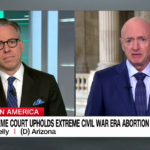
Trump counting on final get-out-the-vote push to fuel narrow path to victory
While polls consistently show the President trailing nationally and in key battlegrounds, the Trump campaign contends that enough battleground states remain in play to give the President a path to victory if they are able to turn out their voters in large numbers on Election Day. The campaign has launched a final 110-hour push to the polls, targeting people it believes to be Trump supporters and getting them to vote.
Trump will travel to the states his campaign considers the most competitive at a breakneck pace in the final weekend of the campaign, holding rallies in Florida, Georgia, Iowa, Michigan, North Carolina, Pennsylvania and Wisconsin. All told he is scheduled to make at least 14 stops from Saturday through Monday. His travel garners significant local media coverage, and his campaign also uses the rallies to identify voters, make sure they have cast their ballots and, if not, use the campaign apparatus to contact them and get them to vote.
“Polls always mattered to some, but they mattered less these days because more and more actual votes have been cast every single day,” said Trump campaign manager Bill Stepien. “Ground game matters — in state after state, we can see the result of President Trump’s grassroots operation, which is simply the best that’s ever been built.”
Campaign officials believe their ground game will make a difference in states that they expect will be close on election night, like Arizona, Florida, North Carolina and Georgia. And in Pennsylvania, Republicans point to an uptick in voter registration and a massive on-the-ground operation that they believe will lead to a Trump victory.
Build your own road to 270 electoral votes with CNN’s interactive map
“Where the ground game matters is where the vote is won on the margins. At some point, we don’t believe that advertising is as effective because of diminishing returns,” said Richard Walters, the chief of staff of the Republican National Committee. “We believe that based on certain turnout models, that the ground game will be what makes the difference.”
As the coronavirus pandemic hit the country earlier this year, Joe Biden’s presidential campaign and most other Democrats halted in-person and door-to-door organizing; Republicans did not. Democrats have cautiously resumed those efforts in recent weeks in key states, but even Democratic Party operatives and officials acknowledge that their relatively limited efforts to contact voters in person could pose a problem on Election Day.
The Biden campaign told CNN that its turnout operation is just as robust as Trump’s, with more than 3,500 field staff on the ground and an aggressive virtual, phone and SMS voter outreach.
“We’ve built a massive organizing program that’s having millions of meaningful conversations with voters online, over the phone, and at safe, socially distanced in-person events, in a way that meets them where they’re at and respects public health,” said Michael Gwin, the deputy rapid response director for the Biden campaign. “The proof that our approach is working is in the pudding: Democrats are turning out in record numbers and voters have made clear that they’re disgusted by Trump and his campaign’s refusal to take this pandemic seriously.”
Few doubt the value of the GOP data operation. It is a complicated modeling system that has been compiling information on potential Trump voters for more than three years. And for Republicans, the difference between a narrow win or loss could come down to putting this operation to work in the manner they have been predicting.
But there is doubt that the ground game will make up enough of the difference if, as public polling shows, Trump is down significantly nationally and in key states.
“If this were the down-to-the-wire race we were all expecting through March, that ground effort would be absolutely critical to winning that last point or two at the margin,” said GOP operative Liam Donovan, who is not affiliated with the Trump campaign. “But a fraught public health environment makes the execution tougher than ever, and absent a polling error even bigger than what we saw in 2016, the states at the tipping point just don’t seem to be close enough for it to matter.”
The decision by the Trump campaign to focus resources on the ground organizing was a strategic investment that banked on a close election. The campaign spent more than $300 million on the data and ground operation and less on television and digital advertising in the final leg of the campaign. Biden and the Democrats are significantly outspending Trump and Republicans on the airwaves nationally and in key battleground states.
Walters believes that if the race ends up being close, the dollars spent on getting out the vote will be of far greater value than additional TV ad spending.
“I always tell people that if the first $300 million on TV didn’t move someone to vote for you, the last hundred million isn’t going to,” he said. “People want to be asked for their vote, they want to not be taken for granted.”

















